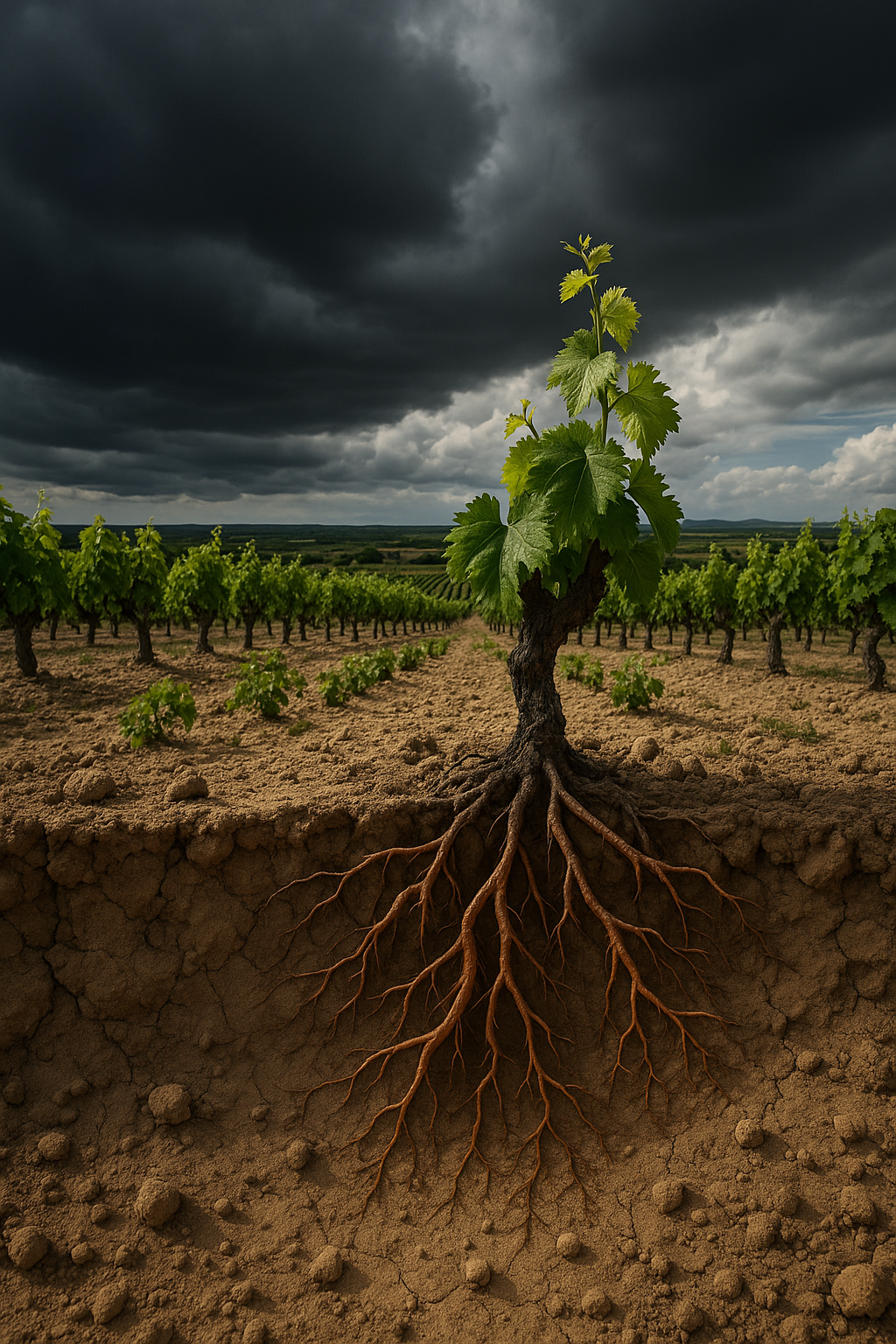Wine isn’t just a drink, it’s a product of soil, sun, rain, and centuries of farming knowledge. Traditionally, vineyards were managed in ways that worked with nature, building resilience so vines could survive hot summers, cold winters, and the occasional tough season.
But today’s ultra-processed wines - the mass-produced bottles you see stacked high in supermarkets - are built differently from these traditional, appellation wines. They’re made for speed, uniformity, and price, not for long-term health (ours or the planet's). And that makes them dangerously fragile in a warming world.
Here are five reasons why industrial wines actually undermine climate resilience and why the small, traditional producers hold the key to the future of wine.
1. Shallow roots and water dependence
Healthy, resilient vineyards rely on deep-rooted vines. Dry-farmed grapes learn to seek out underground water reserves, making them tougher in drought years. But large-scale producers often irrigate heavily. Their vines never bother to dig deep, so when the tap is turned off in a drought, the vineyard collapses. It’s a short-term fix that leaves vines weaker in the long run. The fact that the irrigated vines have roots that sit closer to the surface also make them more vulnerable to erosion & runoff, frost, weed & pest competition, and soil fatigue - not to mention the obvious - drought and heat. The shallow roots also mean a loss of terroir - the taste of place.
2. Chemicals strip soil of life
Soil should be alive, full of microbes, fungi, and organic matter that store water and protect vines from extremes. In fact, a healthy soil is the first defence in water conservation. Traditional farmers know this. Industrial vineyards, however, rely on excessive pesticides, herbicides, and fertilisers. These strip the soil of its natural resilience, leaving it compacted, eroded, and dependent on even more chemicals to survive. Instead of protecting the vines, the system keeps them locked in a cycle of weakness.
3. Too many eggs (and grapes!) in one basket
Mass-market wine is dominated by just a handful of grape varieties: Chardonnay, Cabernet Sauvignon, Merlot, Pinot Grigio… the well-known "international" grapes. They’re popular, but they aren’t always suited to hotter summers or unpredictable frosts. And, they are being grown everywhere across the globe - not in their indigenous climates, where the environment suits them best. By sidelining local, indigenous grapes, many of which evolved to handle specific climates, industrial wine puts all its eggs in one basket. A sudden pest, disease, or weather event can devastate entire regions that rely on a single variety.
4. A big carbon footprint
Ultra-processed wine is resource-intensive: machine harvesting, bulk shipping across continents, refrigeration, and packaging in heavy glass bottles that rack up transport emissions. This bloated footprint makes these wines not only less sustainable but also more exposed as governments tighten carbon regulations. By contrast, small producers using lighter bottles, local sales, and low-intervention methods are better aligned with a low-carbon future. Drink as “local” as you can.
5. Built for short-term profit, not longevity
Industrial vineyards are managed for maximum short-term yield. Vines are pushed hard, then ripped out and replanted every 15–20 years. Because as vines grow older, they grow better, but their output/yields drop. But some of the world’s greatest vineyards, still thriving after 80 or even 100 years, prove that longevity pays off. Old vines with deep roots produce balanced, resilient grapes year after year. In a warming world, those long-lived vineyards will be the ones that survive. I think I was told once Chateau d’Yquem (Sauternes) yields (≈ 8–10 hectolitres per hectare, sometimes less if the vintage is very difficult), work out to roughly one vine = one bottle of wine (in generous vintages) or even one vine = one glass (in the toughest years)!
Fragile by design
Put simply, Ultra-Processed Wines™ are fragile because they’ve traded resilience for volume. They rely on shallow roots, chemical crutches, monocultures, and quick turnover. In the process, they’ve discarded the very things that once helped vineyards withstand drought, pests, and heatwaves. The good news? Every time you choose a bottle from a small, traditional, or dry-farmed producer, you’re voting for a wine future that can endure. Wines made with care for soil, water, and biodiversity aren’t just better for the planet - they are better for you as well. And they taste better too.
So the next time you’re standing in the wine aisle, remember: resilience is in the roots.
